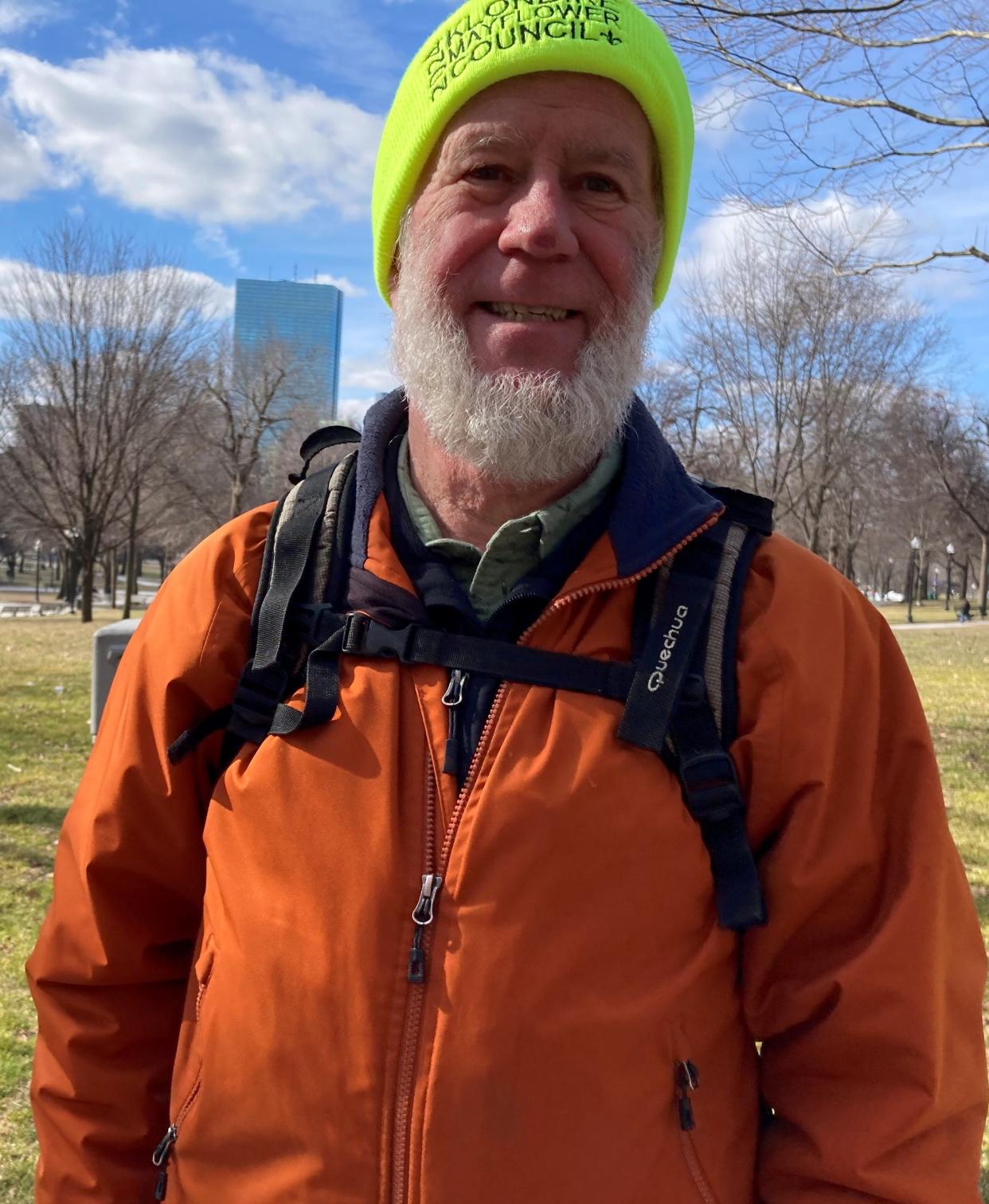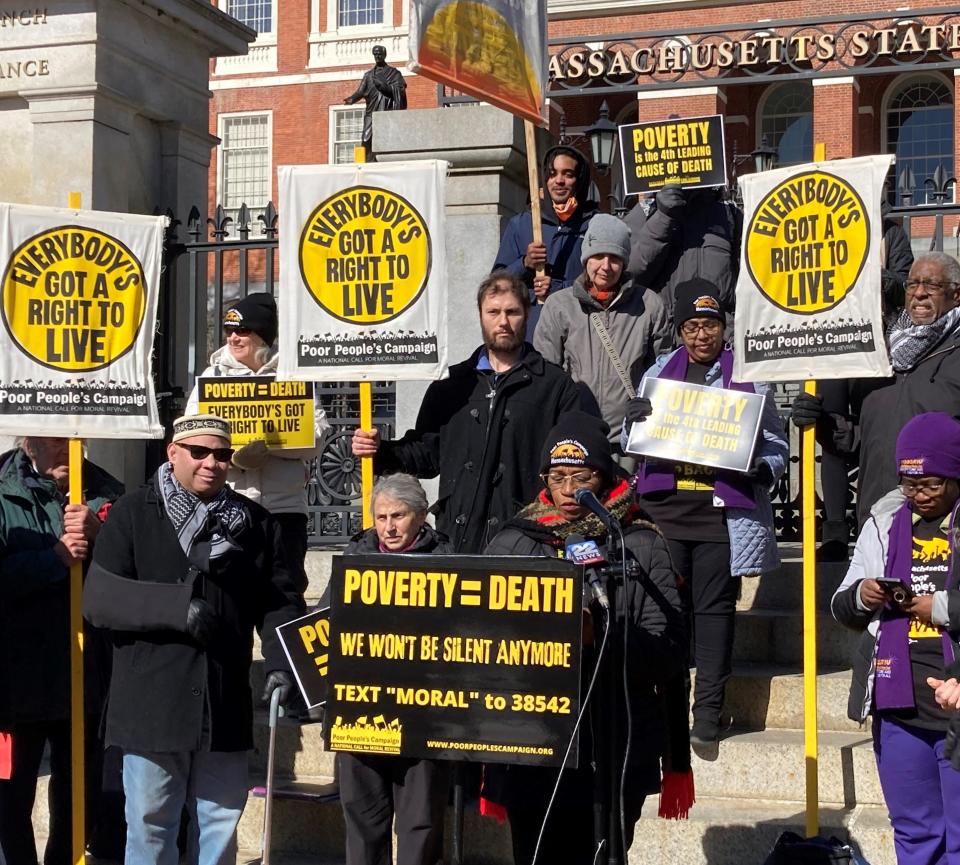Poor People's March resurrected after 56 years; electorate seeking economic justice

- Oops!Something went wrong.Please try again later.
BOSTON - It was as he was walking through the Boston Common, passing the Paulist Center with his two young grandsons, that Tom McClintock reminisced about his first experience with poverty and hunger.
It was in 1968, when he was a junior in high school that he was sent with a group of other students attending St. Mary’s in Brookline to the center to help prepare for a community march against hunger, one of the first in Massachusetts.
“We were making signs,” McClintock told his grandsons, Jack, 7, and Sam, 5. “Someone said we needed footprints, so I stuck my foot in paint and walked across the sign.”
It’s 56 years later and grassroots groups are still organizing to address hunger and food insecurity and to call attention to the depth of poverty in the United States.
On Tuesday, a group that claims its roots in the 1968 Poor People’s Campaign and March on Washington gathered on the Massachusetts State House steps. The new group, dubbed the Poor People’s Campaign, a National Call for Moral Revival, rallied to call attention to national policies that foment poverty, as well as issues specific to the Bay State.
“We live in the richest nation, and we refuse to accept the fact that poverty is the fourth-leading cause of death in the United States,” said Savina Martin, one of three leaders of the Massachusetts Poor People’s Campaign. “Together, we can ensure that the days of poverty and low wages, and the unnecessary cruelty of abandonment amidst abundance, are numbered. Together we can revive the heart and soul of this democracy to ensure dignity and justice for all.”

Organizers announced a nationwide voter mobilization day of action planned for March 2 at the Tuesday rally. Groups across 32 states and in Washington, D.C., have scheduled rallies and marches in their state capitals. The Massachusetts group will meet at 9:30 a.m. at the site of the Boston Massacre, the Old State House, and march to Beacon Hill at 10 a.m., with a rally organized for 11 a.m. at the 54th Regiment Memorial across from the State House.
Demands include a living wage of more than $15 an hour, full voting rights across the country, workers' and labor rights, women’s health care rights, health care for all and accessible and affordable housing. Also included are environmental justice including clean air and water, fully funded education through university, just immigration laws and an end to gun proliferation, profits and related violence.
"It is immoral to have 37 million people without health care," said the Rev. William Barber II, founder of Repairs of the Breach, during a 2018 interview with Amy Goodman of Democracy Now. He listed other immoral situations inflicted on the American people: not paying a living wage, not having single-payer health insurance, not having universal access to education and higher education, and not stopping the resegregation of the nation.
The revival group was launched in 2018 by two faith organization leaders under the banner of Repairs of the Breach, building on the work of the Rev. Martin Luther King Jr. The project was initiated before his 1968 assassination and carried on by his widow who led the March on Washington on May 12, Mother’s Day, less than a month after his death.
The first wave of marchers, mostly women, gave way to a second wave that built Resurrection City, a tent-and-shack encampment that spent a month advocating for the Economic Bill of Rights. The demand was to prioritize $30 billion for anti-poverty measures, including guaranteeing jobs, a fair minimum wage, unemployment insurance and access to education, including higher education.
The current iteration of the group is advocating for similar policy changes that would lift the portion of the U.S. population, estimated at 140 million of the country’s 334 million residents, out of abject poverty.
Awaken 'the sleeping giant'
Their aim is to “wake the sleeping giant,” across the 32 states of millions of poor and low-wage workers to cast their ballots in this election cycle. The organizers are counting on an estimated 85 million eligible voters nationwide to cast ballots and elect representatives who would advocate for anti-poverty policies. In Massachusetts, the organizers estimate there are more than 1.3 million poor and low-income voters.
“Poverty equals death, we won’t be silent anymore,” said the Right Rev. Alan M. Gates, a bishop of the Episcopal Diocese of Massachusetts. Poverty, he asserted, is a political decision. Organizers expect the push to last 40 weeks.
One of the local organizers is Janice Guzmán, of Worcester, a personal care worker, a member of Service Employees International Union 1199, one of the organizations in the coalition forming the campaign.
The Central Massachusetts organizer came to the position naturally, attending meetings with her mother since she was t3.
“My mom was an activist, I’m an activist,” Guzmán said. A union member since 2007, Guzmán was invited to the 2018 march on Washington by the organization as a representative of the low-wage workers impacted by federal, state and local policy decisions that keep Americans impoverished. That’s when she recognized her calling and mission to involve her peers in the struggle for economic and political equity and justice.
Guzmán is concerned with the budget proposed by Gov. Maura Healey that would affect her job, her peers and some 40,000 residents, disabled or elderly, who depend on personal care assistants to complete daily tasks of living, from bathing to dressing and preparing meals. The governor’s proposal would flat-fund the line item, which analysts believe would be tantamount to de facto cuts.
Low wages, cuts to services 'immoral'
The proposed budget would affect the length of time attendants were authorized for meal preparation and change eligibility for residents accessing the service for less than 10 hours a week. Thousands of residents could be expelled from the program, costing thousands of jobs for attendants.
“Cuts to the PCA program are despicable, unfair and immoral,” Guzmán said. “Some consumers (of the service) don’t have family, someone to come in a few hours a week to help with meals, or chores. Even if it’s only 10 hours a week, there’s someone to talk to them, keep them company.”
Union leaders contend that the program allows Massachusetts residents to remain in their homes and to age in place with independence and dignity.
Guzmán vows to keep advocating for her peers and plans to attend the March 2 rally in Boston.
“At the end of each day, 800 people in the United States die of poverty,” Guzmán said.
This article originally appeared on Telegram & Gazette: Unions, faith-based & grassroots organizations launch 40-week project

